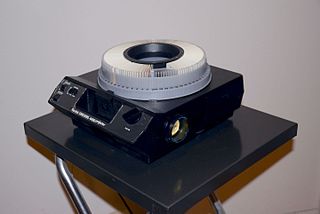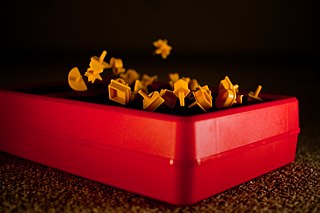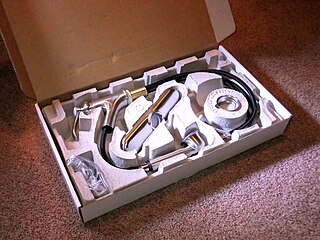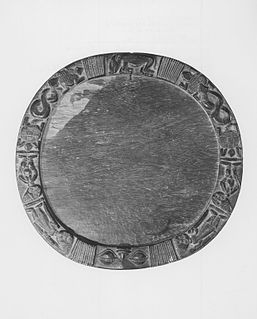See also
| | This disambiguation page lists articles associated with the title Tray. If an internal link led you here, you may wish to change the link to point directly to the intended article. |
A tray is a shallow platform used to carry items.
Tray may also refer to:
| | This disambiguation page lists articles associated with the title Tray. If an internal link led you here, you may wish to change the link to point directly to the intended article. |
Fractional distillation is the separation of a mixture into its component parts, or fractions. Chemical compounds are separated by heating them to a temperature at which one or more fractions of the mixture will vaporize. It uses distillation to fractionate. Generally the component parts have boiling points that differ by less than 25 °C (45 °F) from each other under a pressure of one atmosphere. If the difference in boiling points is greater than 25 °C, a simple distillation is typically used.

A tray is a shallow platform designed for the carrying of items. It can be fashioned from numerous materials, including silver, brass, sheet iron, paperboard, wood, melamine, and molded pulp. Trays range in cost from inexpensive molded pulp trays which are disposable and inexpensive melamine trays used in cafeterias, to mid-priced wooden trays used in a home, to expensive silver trays used in luxury hotels. Some examples have raised galleries, handles, and short feet for support.

A fractionating column or fractional column is an essential item used in the distillation of liquid mixtures to separate the mixture into its component parts, or fractions, based on the differences in volatilities. Fractionating columns are used in small scale laboratory distillations as well as large scale industrial distillations.

A TV dinner is a packaged frozen meal that comes portioned for an individual. A TV dinner in the United States and Canada usually consists of a type of meat for the main course, and sometimes vegetables, potatoes, and/or a dessert. The main dish can also be pasta or fish. In European TV dinners, Indian and Chinese meals are common.

Optical disc packaging is the packaging that accompanies CDs, DVDs, and other formats of optical discs. Most packaging is rigid or semi-rigid and designed to protect the media from scratches and other types of exposure damage.

A carousel slide projector is a slide projector that uses a rotary tray to store slides, used to project slide photographs and to create slideshows. It was first patented on May 11, 1965, by David E. Hansen of Fairport, NY. Hansen was an industrial designer at the Eastman Kodak Company. A patent for the rotary tray was granted in 1966 after a 1962 application by the Eastman Kodak Company.

An ice cube is a small piece of ice, which is typically rectangular as viewed from above and trapezoidal as viewed from the side. Ice cubes are products of mechanical refrigeration and are usually produced to cool beverages. They may be produced at home in a freezer with an ice tray or in an automated ice-making accessory. They may also be produced industrially and sold commercially.

In duplicate bridge, a board is an item of equipment that holds one deal, or one deck of 52 cards distributed in four hands of 13 cards each. The design permits the entire deal of four hands to be passed, carried or stacked securely with the cards hidden from view in four pockets. This is required for duplicate bridge tournaments, where the same deal is played several times and so the composition of each hand must be preserved during and after each play of each deal.
Tha Eastsidaz was a hip hop trio consisting of Snoop Dogg, Tray Deee and Goldie Loc. Their first appearance was on Tommy Boy Records' The Ride: Music from Dimension with Crooked Eye Q on a Battlecat-produced song called "Feels So Good" in 1997.
Tracy Lamar Davis, better known by his stage name Big Tray Deee, is an American rapper signed with Snoop Dogg's label Dogghouse Records.

Perfection, originally produced by the Pennsylvania company Reed Toys, is a game by the Milton Bradley company. The object is to put all the pieces into matching holes on the board before the time limit runs out. When time runs out, the board springs up, causing many, if not all, of the pieces to fly out. In the most common version, there are 25 pieces to be placed into a 5×5 grid within 100 seconds.

A screen is a device used in some tournaments in duplicate bridge that visually separates partners at the table from each other, in order to reduce the exchange of unauthorized information and prevent some forms of cheating. It is a panel made of plywood, spanned canvas or similar material, which is placed vertically, diagonally across the playing table, with a small door in the center and a slit beneath it. The door is closed during the bidding stage, and the players place their calls using bidding cards on a movable tray, which slides under the door. After the opening lead, the door is opened, but its size allows the players only to see the hands and cards played from the opposite side of the screen, not their partner's face.
Skin pack, or skin packaging, is a type of carded packaging where a product is placed on a piece of paperboard or in trays, and a thin sheet of transparent plastic is placed over the product and paperboard or trays. The printed paperboard/tray usually has a heat-seal coating. The plastic film is softened by heat and draped over the product on the card/tray. Vacuum is sometimes used to assist a firm fit. The film bonds to the heat-seal coating on the paperboard. The skin-packed piece then may need to be cut into individual units.

In the electrical wiring of buildings, a cable tray system is used to support insulated electrical cables used for power distribution, control, and communication. Cable trays are used as an alternative to open wiring or electrical conduit systems, and are commonly used for cable management in commercial and industrial construction. They are especially useful in situations where changes to a wiring system are anticipated, since new cables can be installed by laying them in the tray, instead of pulling them through a pipe.

The Tray Mountain Wilderness was designated in 1986 and currently consists of 9,702 acres (39.26 km2). The Wilderness is located within the borders of the Chattahoochee National Forest in Habersham, Rabun, Towns and White counties, Georgia and is managed in the Chattooga Ranger District. The Wilderness is managed by the United States Forest Service and is part of the National Wilderness Preservation System.

Molded pulp, also named moulded pulp or molded fibre, is a packaging material, that is typically made from recycled paperboard and/or newsprint. It is used for protective packaging or for food service trays and beverage carriers. Other typical uses are end caps, trays, plates, bowls and clamshell containers.
A theoretical plate in many separation processes is a hypothetical zone or stage in which two phases, such as the liquid and vapor phases of a substance, establish an equilibrium with each other. Such equilibrium stages may also be referred to as an equilibrium stage, ideal stage, or a theoretical tray. The performance of many separation processes depends on having series of equilibrium stages and is enhanced by providing more such stages. In other words, having more theoretical plates increases the efficiency of the separation process be it either a distillation, absorption, chromatographic, adsorption or similar process.
Milk Tray is a brand of boxed chocolates currently manufactured by Cadbury. Introduced by Cadbury UK in 1915, it is one of the longest running brands in the confectioner's portfolio. Milk Tray is sold in Australia, Canada, Ireland, New Zealand, New York City, South Africa and the United Kingdom.
EmailTray is a lightweight email client for the Microsoft Windows operating system. EmailTray was developed by Internet Promotion Agency S.A., a software development company.

An ọpọ́n Ifá is a divination tray used in traditional African and Afro-American religions, notably in the system known as Ifá and in Yoruba tradition more broadly. The etymology of opon, literally meaning "to flatter", explains the artistic and embellished nature of the trays, as they are meant to praise and acknowledge the noble work of the Babalawo (diviners). The etymology of the term Ifá, however, has been a subject of debate. Ifá may be considered an orisha, or a Yoruba god — specifically, the god of divination Orula. Conversely, some scholars have referred to Ifá merely as the "great consulting oracle" as opposed to a god or a deity, without any divine connotations.